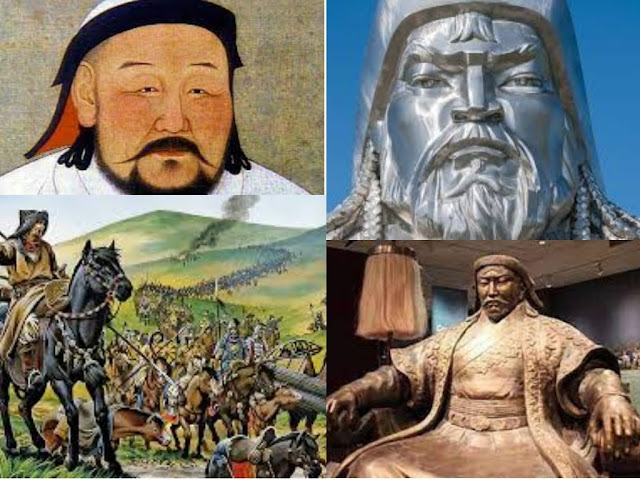Genghis Khan was a ruthless but brilliant military leader, the unifier of the Mongols and their “universal leader”. Through strategic military campaigns and brute force, he and his army conquered empires, expanded their own, and ended many tribal disputes.
Genghis Khan
Genghis Khan was born in Mongolia around 1162. Little is known about his early life, and some of the sources we have are often contradictory. There are reports that he was born with a blood clot in his arm – a sign that he was destined to become a leader. Changul Khan was a descendant of Khabul Khan, who united the Mongols in the 1100s against the Chin dynasty of northern China.
At the age of 9, Khan’s father took him to live with his future bride, Borte, and his family. On his journey home, his father was poisoned. Genghis Khan returned home with the intention of claiming his role as Genghis Khan. The clan overthrew him and his younger brothers. Genghis Khan later killed his half-brother, confirming his position as head of the family. Khan married Borte at 16, but had several children with other wives, as is Mongolian tradition.
Genghis Khan was captured and enslaved by former family associates. After escaping, he joined his brothers, formed an army, and began his mission to end the division of the traditional tribe and unite the Mongols. He avenged his father’s death, used his large cavalry to defeat those who enslaved him, and gained control of central and eastern Mongolia.
Tribal leaders gave him the title “Genghis Khan”, which means “universal leader”. Divinely and spiritually, he was declared the supreme deity of the Mongols by the people of Mongolia. Genghis Khan cleverly used diplomatic relations to establish trade relations with other empires in the West and Muslim countries to bring prosperity to his kingdom. When the Khwarizm dynasty mistook their caravan for an espionage mission, Khan unleashes a brutal attack. This was followed by a period of peace, during which Khan linked the major trade centers between China and Europe, and his practical laws governed the empire. Genghis Khan died in 1224. The cause of death is unknown and he was buried according to his tribal customs without any traces. He appointed one son as the supreme leader and divided the rest of the empire among his other sons.
Overall, we can say that Genghis Khan was a great military leader, he was a skilled strategist as well as he was extremely cruel. He had established an extensive espionage network and was motivated to adopt newer technology than his opponents. He coordinated the movements of his army through smoke and torch signaling systems. They also set up drums and flags to give orders on the battlefield.
Genghis Khan’s religion
Genghis had a similar attitude towards religions. In his army, Buddhists and Muslims were believers of all religions. He did not follow any one religion. Nehru writes that when the power of the Mongols had increased immensely, the Vatican clergy tried to convert them to Christianity. The ‘Khan’ behind the name Genghis did not mean that he was a Muslim. Genghis was a follower of Shaminism. This religion is prevalent in areas like Mongolia, Siberia etc.
Great writers like Vassili Yen or Kamleshwar have been explaining that there is no enmity of any particular religion towards humanity and this barbarism is not religious but political. Perhaps this is the reason why Mongolians consider Genghis Khan to be a great king, not a son of Satan.
Genghis Khan died on this day in 1227. His last words were, ‘I wanted to conquer the whole world. But one age is too short for this.’ He wished that no one should know where he was buried after his death. That’s why all the soldiers who went to bury him were killed. Even today, efforts are on to find the tomb of Genghis Khan.
Reasons for Genghis’s Success
Robert Green attributed the success of Genghis to the agility of his army, his excellent cavalry and the use of fireballs as weapons. The Chinese see Genghis’s victory over Green Khwarism as the result of the ‘slow-by-speed’ strategy of the war. At the same time, Nehru has considered his discipline as well as his light and fast working army as the reason for this success. Genghis’s lashkar was light.
Russian historian Vasily Yen has done a lot of research on the life of Genghis Khan. In his book ‘Genghis Khan: Son of the Devil’, it is written that Genghis’s army carried less weight and used to kill and eat horses that were tired or useless to eat.
According to Nehru, the ability of Genghis is also defined by the fact that he made a series of brilliant generals one after the other. In this the names of Jochi, Jebe and later Genghis’s son Chagatai etc. are prominent.
Important achievements of Genghis Khan
- escaped from the enslavement of his empire and resumed
- Several Mongol tribes united under one empire
- Awarded the title of Genghis Khan, meaning “universal leader”, Clearly, he was the epitome of the so-called spiritual power that defeated empires and decimated dynasties, established trade routes and expanded their respective cultural horizons and knowledge, and expanded their empires based on laws that were practical.
- Honored as the Founding Father of Mongolia
Genghis Khan Quotes
“I am God’s punishment. If you had not committed great sins, God would not have sent punishment on me.”
“If you take a decision in anger, failure is the act of it”
“Nothing’s worth until it’s over.”
